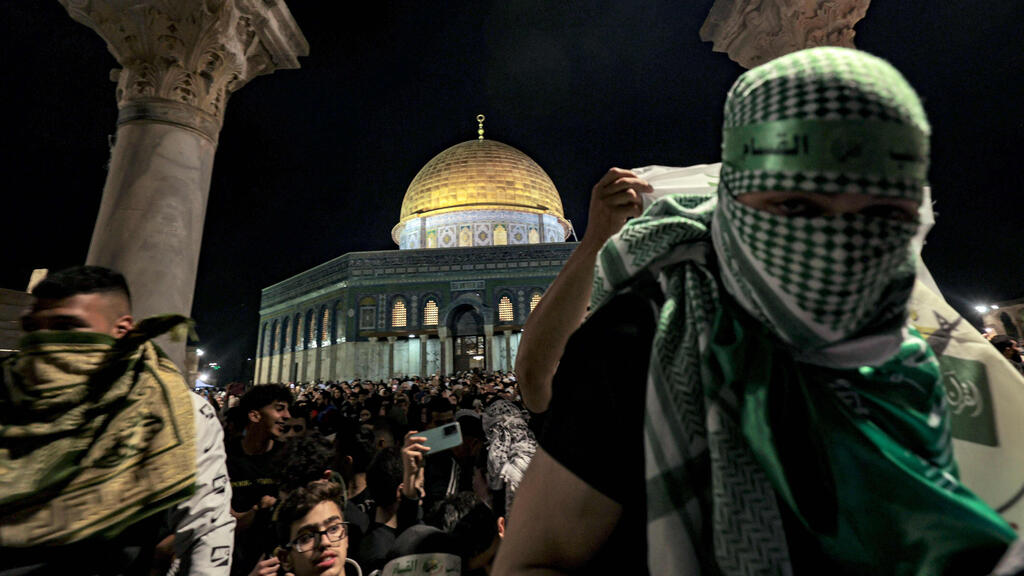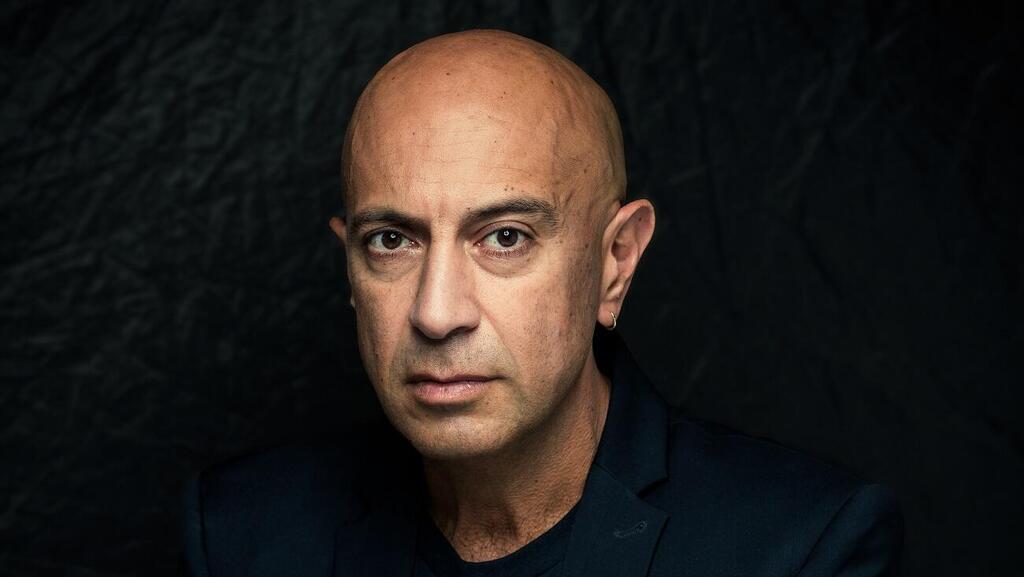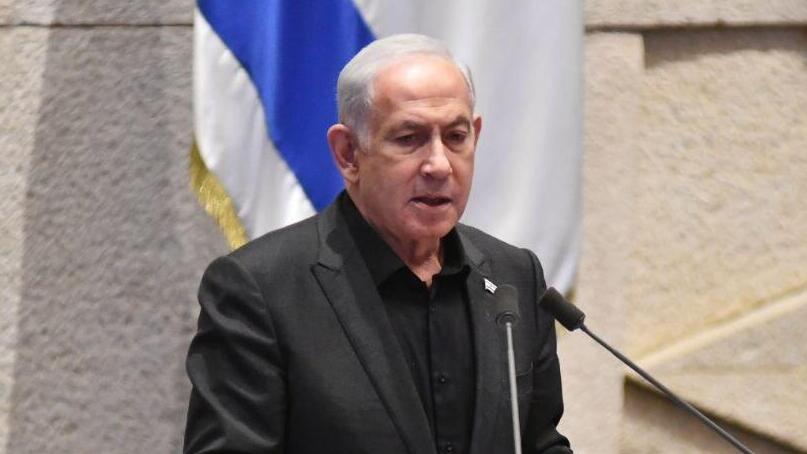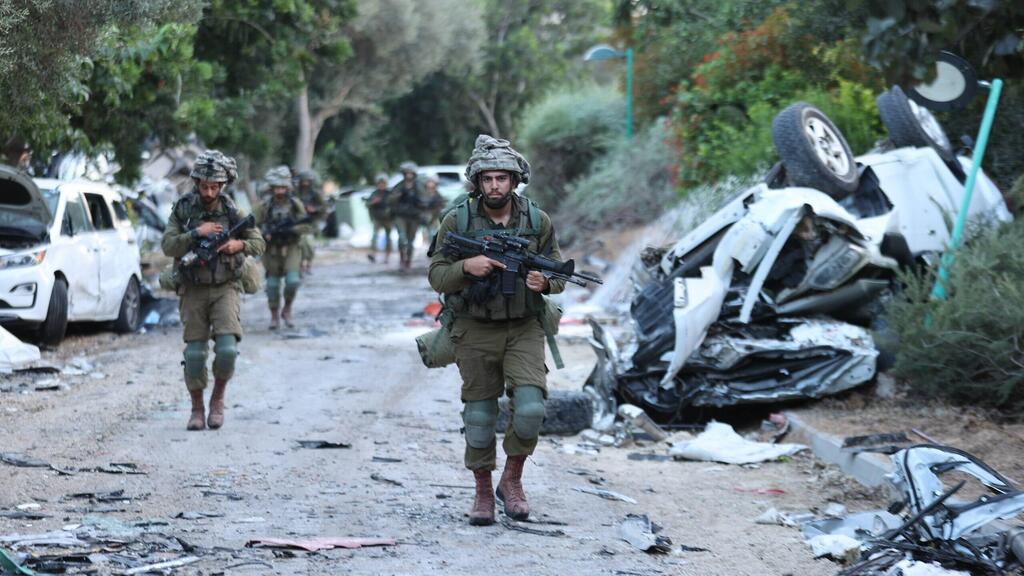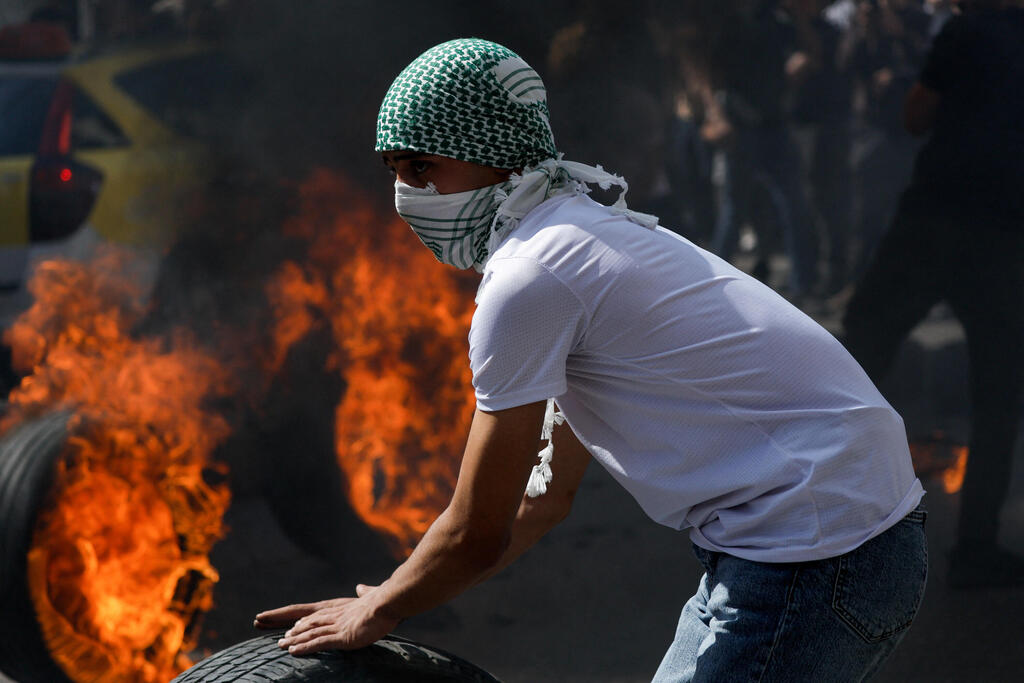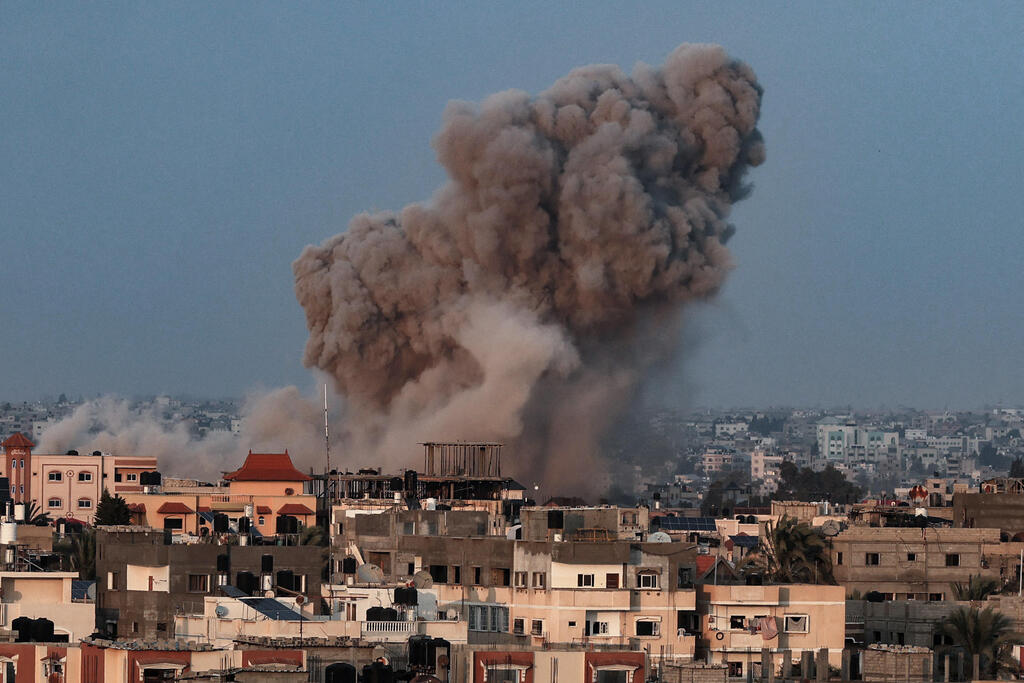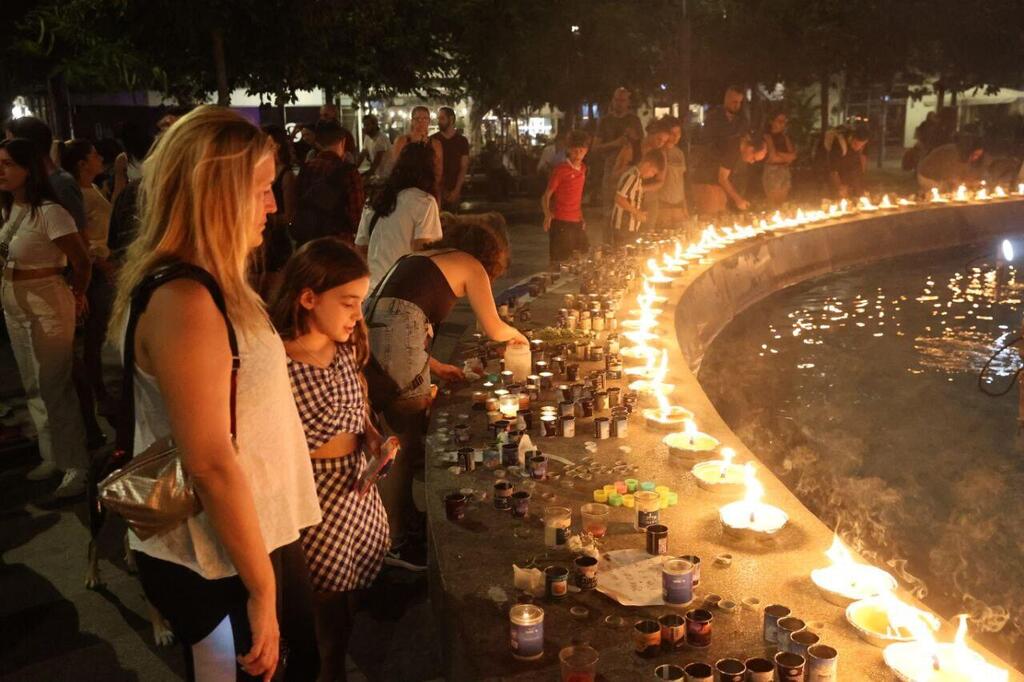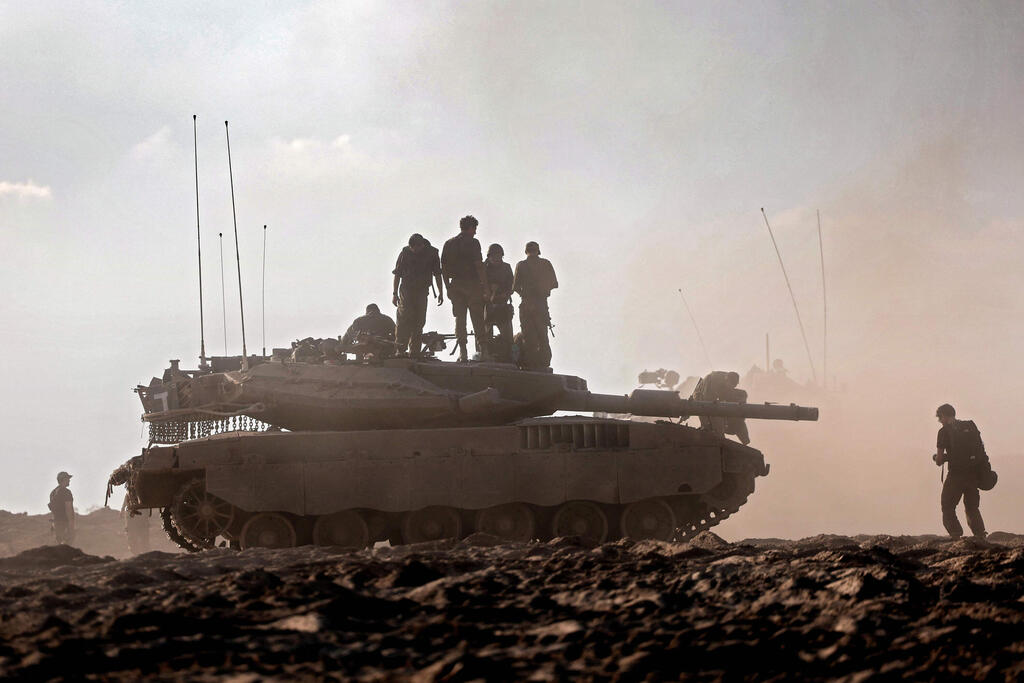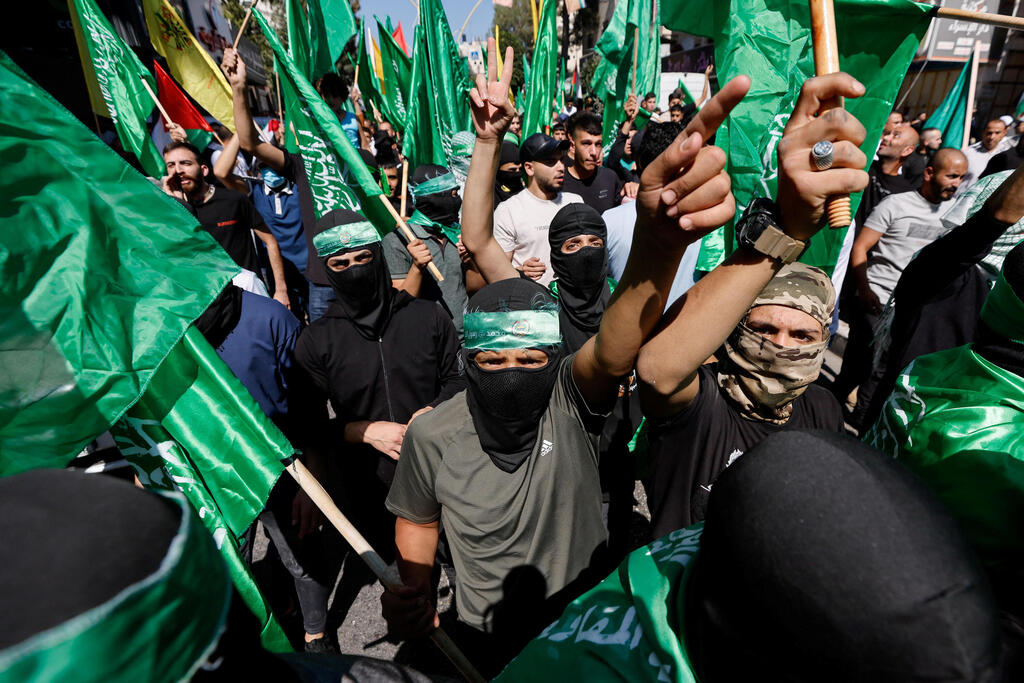Getting your Trinity Audio player ready...
It could have been a great spoiler for next season’s Fauda, but it's a sad, desperate reality - surpassing anything the imagination might conjure up. During and following their military service, Fauda creators, Avi Issacharoff and Lior Raz witnessed everything possible in Gaza's darkest alleys. But even in their worst nightmares, they couldn’t have imagined the hell we’re seeing now could be conceivable and even ruled out a plot-line frighteningly similar to what’s currently happening on the ground.
More stories:
"Let me tell you a secret," says Issacharoff. "In the fifth season Lior, myself and Noah Stollman, the head writer, thought of a plot line similar to what’s happening right now. We ruled it out after exactly five minutes.”
Because it sounded too far-fetched. No one would have believed it
“Precisely. You just say to yourself: ‘Really? That simply wouldn’t happen.' I mean, the likelihood of all these things happening at once, on the same day and everything going wrong for you is just so low that we never revisited the idea. It reminds me of what an old friend of mine, Amos Harel, says – it’s like winning the lottery twice - but the other way around. All the scenarios to your detriment lining up in a row. What are the chances of the political and military echelons not reinforcing these borders with battalions during the holidays? If there had been more battalions on the border it would have looked very different for sure. Of course, people would have been killed, but it wouldn’t have looked like this.
What about intelligence?
“That’s right. There was no intelligence alert. What’s the likelihood of there being nothing from the Shin Bet or from Military Intelligence? And then you ask yourself what are the chances of Israel entering into any kind of agreement with an organization calling for Israel’s destruction rather than an organization seeking peace – like the Palestinian Authority. I’m telling you this now laughing, and with a sense of irony. But I’m listening to myself and it’s pretty farfetched.”
We might say everything just collapsed like dominos
“What are the chances of the IDF's observation points not detecting anything, because they destroy the antennas from the air and they can’t see what’s going on? What are the chances of there being no air force? Where was it? The border was being breached for hours with balloons and drones. You ask yourself how could this be? At the most urgent of times, there’s no Air Force response. Everything worked out against us and in Hamas’s favor.”
Hamas did surprise us with the ease of the operation.
“I think that they’re shocked themselves by how they operated against us. They don’t think they imagined they’d reach these numbers of fatalities and that they’d be holding over a hundred captives. I’m sure they didn’t think they’d get even close to these numbers.”
'They told us we must strengthen Hamas'
Avi Issacharoff, like the song, is a child of the winter of 1973. He was born in Jerusalem, attended Leyada High School, served in an elite Duvdevan unit when he was injured by a bullet in the buttock area during an operation in Hebron and was treated by Dr. Baruch Goldstein. He wrote his thesis on Hezbollah and the Second Lebanon War as part of his Middle Eastern Studies program. 23 years ago, he joined the media, initially as an Arab affairs correspondent for Kol Israel, moving on to work for Ha’aretz and the Walla website.
He’s authored two books with his good friend, Amos Harel. the Seventh War: How we won and why we lost the war with the Palestinians and 34 Days: Israel, Hezbollah and the War in Lebanon – both winning prizes from the Institute for National Security Studies at Tel Aviv University.
For the past nine years, along with friend, Lior Raz, he’s been very much in full international view. The first series of Fauda, broadcast on YesTV, earned widespread popularity – the series ultimately being purchased by Netflix. Fauda stars are recognized internationally, especially in Arab countries where the series has scored very high ratings. The series has won countless awards and has been very well-reviewed. In early 2022, Yediot Aharonot reported that Avi Issacharoff registered and “exit”, as the production company was sold to Candle Media for $50 million.
And yet, nothing in this extremely impressive resumé prepared Avi Issacharoff – or any of us for that matter – for the inferno in which we are now living.
Let’s start with what seems like a simple question: Why now? We’ve handed over to Hamas suitcases with millions of dollars, we’ve facilitated continued use of infrastructure, we’ve eased up regulations on the crossings. Where did this come from?
“I’m losing sleep over this very question. Over the last decade, I’ve met with lots of senior Israeli security figures. Following Operation Protective Edge in 2014, and more so later, we kept hearing that Hamas had gone through some kind of metamorphosis and that it has reined itself in and that its function is ruling Gaza. That’s what it does. It governs. This is where we missed the point. Here we missed the point. One of my blind spots, that of the army and others, is that we weren’t seeing what was right in front of us – Hamas’s ideological commitment.”
You mean the destruction of Israel
“Put simply, yes. It’s not like they were hiding it. We just chose not to see it very well. Since I’ve become a journalist, these are the messages coming from Hamas themselves. I met Ahmed Yassin in the Gaza Strip. The meeting was coordinated by Ismail Haniyeh who was his chief of staff at that time. Yassin explained to me then, that there would be no state of Israel, i.e. that they are still committed to destroying us. I half-joked in my response by asking him what they would do with everyone here. He replied that we should return to our homes from before 1917. I said to him ‘Hey, Ahmed. My family came before 1917’. He said that I could stay and receive Palestinian citizenship.“
It sounds like a rather jokey conversation
“I didn’t think he was joking, but sometimes you don’t really take it in. It was very comfortable for us to think ‘Okay, let’s do business with them because we don’t have any other partner on the Palestinian side’. That’s what we were being fed since 2009. We were told that there was no Palestinian Authority and that we could reach live-an-let-live understandings with Hamas. Sometimes we’ll strike them, sometimes they’ll launch rockets, but that’s about it. Since 2009, the political echelon has been telling us that we have to strengthen Hamas and weaken the Palestinian Authority, the very opposite of Ehud Olmert’s government’s contention that we needed to tear apart Hamas and embrace the Palestinian Authority.“
Avi, who said this? Let’s name names
“Netanyahu’s governments since 2009 have been bent on avoiding any diplomatic process with the Palestinians. Let’s strengthen Hamas, meaning money, electricity, water, truckloads of goods, easing up on work permits for Palestinians working in Israel, meaning 18 and half thousand people coming in every day.“
This kind of war takes a long time to prepare, a lot of people know a lot of stuff. How did all of this pass beneath Israel’s top intelligence?
“I don’t know. I just don’t understand and that’s why it looks so far-fetched to me. It’s not a posse of two or three people breaking their way in. It’s an operation with 150 fighters in the first wave, followed by many more. If I had to guess, maybe they could keep it all undercover by going back to the Stone Age, with no phones, no computers – just passing around notes and verbal messages. Much of today’s intelligence relies on technology. The moment you turn off your phone and you’re not using your credit card, and you’re nowhere near other mobile phones, it’s much, much harder to find you. So you say, okay, we need the good old-fashioned kind of intelligence on the ground. But there’s less of it there, because you’re not ruling Gaza. This is how catastrophe unfolds.“
How do you feel about how the Shalit deal was handled?
“Sinfully. Whichever way you look at it, this was one of the country’s greatest strategic mistakes. There are people out there who won’t agree with me and might ask me why I didn’t speak up at the time. But I remember as I was with Ilana Dayan’s team on the day that they released the prisoners in the Shalit deal. I was asked how I saw the future. Would it be a black future? I said I didn’t see a black future, but rather a green one i.e. the color of Hamas. And that’s what’s happened. The whole of the Hamas leadership in Gaza today were released in the Shalit deal.”
Is this where you see the root of what we’re seeing now?
“Listen, what we’ve created with our own hands is crazy. We’ve created a monster – the strongest force in the region – and they hit us very hard – like nothing before. We now need to change the record and change the discourse of ‘let’s reach a ceasefire or an understanding, or give them more work permits.’ Enough, it’s over. I’ve spent a lot of time in the Gaza Strip, I know it very well. I’ve spent hours with the Hamas leadership. We fell for it. We believed that we could do business with them. That was our greatest mistake and this is the enormous price we’re now paying, primarily since the Shalit deal.
We now have hundreds of Gilad Shalits in Gaza, including women, babies and old people.
“It’s terrible, but when there’s a threshold for every horrific incident, it dulls the pain. If you have 500 or 600 people abducted, you just can’t hold back anymore
In the third season of Fauda, after studying the matter in great detail, l Issacharoff and Raz portrayed an Israeli teenage couple being abducted into Gaza. “And even then, we wrote a chance abduction by the border, unrelated to a serious military operation, but rather a personal operation of a young boxer accused of collaboration, acting to clear his name. Even then, we didn’t imagine that such a well-planned operation could take place.”
Can you explain what the abductees are going through? There are women and teenage girls there, evoking serious concerns about abuse
“I’d rather not answer that question at this stage.”
Is there reason to be optimistic about their captivity conditions in Gaza?
“Let me tell you a secret. After the third season of Fauda, I got a phone call from someone whose family took part in the abduction of Gilad Shalit. He was already living overseas. He had been a super-wanted man for many years. His brother was a senior operative in Gaza. He calls me saying he’d watched Fauda 3 and that he was very angry with me. I asked why. He explained that I’d made them look bad – like people who abduct teenage girls and a family that would hold a woman hostage. It’s shameful. Yes, they were part of the Shalit abduction, and he had no problem with that, but why did I portray them as holding a woman hostage?”
But when we have the pictures of the old woman being pushed around in a cart, like a horrific circus act, or the video you’re not sure is real, showing a little boy being taunted by Palestinian children, how useful is that?
“I’m sure these pictures don’t serve Hamas as well as we might think. It’s their pyrrhic victory. It’s a PR own goal for Hamas. I’m talking as one connected with companies in Europe and Hollywood. People are horrified by the pictures. World public opinion is against Hamas, perhaps the only surprise in our favor.“
Issacharoff is calm and softly spoken, but doesn’t try, even for a moment, to hide the fact that he’s raging inside.“The only thing the country should be concerned with right now is how to eradicate Hamas. We can talk about deals at the next stage. We need to make Hamas curse the moment they started out on this military adventure. If we don’t make them regret that moment, we’ll have a similar thing this time next year.”
Bottom line, what should we do?
“I’m glad to see the emergency government with Eizenkot and Benny Ganz. We need to get the crazies out of the government and then a war leading to capitulation.”
Do you mean conquering Gaza?
“I don’t think you don’t need to conquer the whole of the Gaza Strip, as the aim should be causing the downfall of Hamas in the strip. In Operation Cast Lead in 2008-9, Galant, with his forces, made it very close to the government HQ in Gaza. They were only a few miles away and they decided to stop. This time, they shouldn’t stop. We should take it as far as possible within the Strip, while controlling all major routes. We need to deal with their cells, one at a time. All this, after taking control of Hamas’s government complex by the sea.“
And then?
“Here it gets big. The moment you bring down a government of an extremist Islamic organization, the message goes out to the world. The Hamas government must be brought down and they we can start pushing the diplomatic process. If you’re not looking forward, not seeing a diplomatic process after this, you shouldn’t be carrying out such a military operation. At some stage, we’ll need to push for a diplomatic agreement with the Palestinian Authority.“
What’s the price of overthrowing Hamas?
“It’s very high. But nothing comes even close to the casualty numbers we’re dealing with now, unless you’re going for years of activity there - and there is that option. What do we do if there’s no one sensible to take control of Gaza? If the Palestinian Authority fails? We must be ready for this too. It’s not like there’s a guide as to how to get this done.“
We’ve known all along that we’ve only got bad options, but we thought that Hamas rule was the least terrible. We now realize that this is the harshest option. I believe we need to rethink the Palestinian Authority returning to the Gaza Strip – which is what Olmert wanted – more or less what we now have in the West Bank. I’m not sure if it can be done. But if you break down the multitude of Hells that is Hamas, yes, it can be done.“
Netanyahu quoted Bialik, saying “No such revenge - revenge for the blood of a little child - has yet been devised by Satan." How far do you think that says we’ll go?
“Netanyahu talked about revenge. I didn’t hear him utter the words ‘We’ll bring down Hamas.’ Bibi is always talking on two front – he’s addressing his base, while isn’t committing to destroying Hamas or its rule. I don’t think we should be talking about revenge. We need to create deterrence. The message needs to be so harsh that any idiot with a Kalashnikov in the Gaza strip, in the next century will think a hundred times before using it."
Do you think the world will support this? Innocent people will be killed.
“I’ve never received so much love and support from people all over the world for being Israeli. Hamas awoke from the operation, realizing it looks like a monster. We can’t go back to where we were and they’ll pay a very high price – even if there are negotiations. And there will be.”
What does that mean in military terms?
Completely bringing down Hamas in the Gaza Strip – to the point of destruction –sending a clear message to other organizations. This means hitting all of the Hamas leadership, be it military – anyone in Hamas should be killed. It’s over. We did it in 2004 when we brought down the political leadership in Gaza – Yassin, Rantisi – they were all killed. The leadership is sitting in Doha, Qatar, in front of video screens showing them what’s going on here. They’re praying together and they’re happy. You tell me, why are they still alive? Why are they still breathing? Why can we operate against them in Damascus but not in Doha? We need to change the way we operate against Hamas.”
“We’re at our lowest point since the establishment of the state. Never since the Holocaust have so many Jews been killed on a single day. Is it even possible to rise up from this kind of disaster?
“There clearly will be a rising– like after the Holocaust. I’m also certain that we’ve reached one of our lowest points. I don’t remember these numbers of people killed, not even on the first day of the Yom Kippur War, engrained in us as a trauma, but I’m looking ahead – to the people living around the Gaza border, each and every one of them, the one’s that survived by making schnitzel, each one knows people who were murdered or abducted or spent hours in the sealed rooms, fighting for their lives. “
How can they go home like this?
“Most of these people won’t return to their homes unless Gaza is hit so hard, that in a hundred years’ time, they won’t look back and not dare do this kind of thing again. They have to understand this: If Gaza isn’t hit harder than ever, if Hamas isn’t with a dagger at its neck and all the Hamas leadership are gone, one after the other – there will be no arising out of ashes. No sovereign state would allow such a thing. This is the interpretation of our September 11.”
A scarred soul
And as on September 11, we’re talking about a further trauma of a country in a daily state of post-trauma. Itzik Saidyan’s suicide attempt and the voices of artists like Idan Amedi and Raviv Kaner who highlighted the plight of shell-shock in recent decades. This time, it was whole families – women, children witnessed horrific scenes that are hard to erase.
“These people will pay a heavy psychological price,” says Issacharoff. “Those in captivity, those rescued from captivity, those saved from death, the wounded, the fighters in the battles. There may be thousands of people after this with deep psychological wounds. Some won’t sleep at night, some won’t function, but this is the price of war. You’re right. We, as a country, are post-traumatic.”
Are our systems equipped to treat them?
“Right now, our systems don’t know how to deal with anything and don’t know what to do with something like a hundred missing people. We’re now a few days in and the system hasn’t really registered it. The Israeli system hasn’t been able to deal with post-trauma. Just look at what happened in the rehabilitation unit at the Ministry of National Security with Itzik Saidyan. Foundations and organizations had to drag the country into recognizing the problem. But the country can no longer just tell people to go home, that they’re not post-traumatic. It’s not happening.”
It may be too soon to say, but how do you think this disaster will shape us?
“That’s a very hard question. The optimistic scenario is that we have to stop dealing with nonsense. What do I mean by that? Yariv Levin, Dudi Amsalem who was verbally abusive towards the pilots and the ‘privileged’. He had the gall to show up donning a Rolex and sporting Cartier. That’s nonsense. People courting hatred and incitement have forgotten that we’re one people here. So, I want to believe that we’ll wake up and understand that people who knowingly create hatred have to go home. That’s the only way we’ll become united.“
And the less optimistic scenario?
“The worst scenario is that the political echelon will come out clean and blame the military for everything – and then there’ll be nothing to stop Israel from turning into a state under Fascist rule. Right now, I’m leaning toward the optimistic scenario, because the country is waking up. Most of the population, including Bibi voters, have gotten up and asked themselves what the hell happened here?”
The marginal extremists, fueled by foreign media outlets actually do have answers: a conspiracy with traitors from within, bringing Hamas into our gates.
“That’s the usual garbage. Morons are spewing crap and the darkness in their souls all over social media. It’s not even worth addressing. I think that these kinds of accusations are just trying to deflect blame. Instead of seeing the failure on a political level, let’s ask who helped people over the fence. It’s just trying to incite the conversation. Let’s not get dragged into that. When I see these kinds of accusations, I just ignore them. Talking about it is a waste of time and our time is especially precious right now.”
We were raised on the myth of the IDF being the best army in the world, the fastest, the most efficient, with the furthest reach, with intelligence allowing precision bombing of the nuclear reactor in Iraq in 1981. Now, we’re suddenly hearing people saying that maybe our army’s not good enough
“Any organization, however strong, has its low points, the moments you ask yourself how we got to where we are. No organization or government is immune to mistakes. At the very end, we’ll find ourselves strengthened and we’ll rehabilitate ourselves. The IDF knows very well what it’s facing now.“
On the other hand, we were raised Rambos. Yair Golan, Noam Tibon went in on their own – like in the movies – and rescued people from the clenches of Hamas
“These people have been called all sorts of names. Anarchists, terrorists. They were told to go to hell. Some people even called them Tanzeem. As a reporter and as a soldier, I knew Tanzeem, so I just laugh off comments like that. Quite the reverse. It’s a compliment. All the abuse just brings more people out onto the streets. They can carry on as far as I’m concerned.”
You also know Noam Tibon well
“He’s my neighbor and his son, Amir, worked with me. You can only shiver when you hear the crazy stories about this guy, who fought for his family’s survival. I was in tears when his wife, Gali, told me how Noam saved his family. These courageous people have been denounced. The day will come when all the mouthpieces will wake up and apologize.”
You’re on the receiving end of these mouthpieces. There’s a dissonance here. On the one hand, you’ve taken part in very daring actions in the West Bank, and on the other, you’re accused of not being patriotic enough
“I take it actually very well. A lot of people taking part in the protests against judicial reform, ‘Brothers in Arms’, or other organizations, are from combat units and have been through some hard stuff- battles, injuries, losing friends, etc. All the people making noise are just dogs barking as the protest convoy carries on and won’t stop. What has stopped is the reform. I see no contradiction between what I say and convey and my military past.“
Me neither
“I protest because I’m fighting for democracy, for what our country will look like. And whoever has a problem with that – just get over it. Some things almost make me laugh, like people explaining to me that this is a protest of Ashkenazim and privileged people... blah… blah… Who are the people saying this? Messengers of the privileged Ashkenazi elitist from Rehavia. You guys come and tell us who or what Mizrahi is? You are the elite, coming to tell us how to be a good Mizrahi. And who are these people telling me this? Netanyahu’s people, Levin, Rothman. Who are they to tell me what a good Mizrahi is?”
And they’ve been ruling Israel, almost continuously since 2009
“So, who here is a second-class citizen? Are you nuts? I just can’t stand it when people say stuff like that. If you support rights for weaker people, that’s great, let’s go – make it happen. Natan Eshel himself said that our people understand hatred, that it’s a mantra.”
I saw a comment saying that instead of getting Yair Golan in the cabinet, we got Mai Golan, and instead of Noam Tibon or an expert like Avi Issacharoff, we got Smotrich who’s making jokes at Israel’s darkest hour
“I’m not a general and nor is Noam. I’m now on my way to distributing food to people in the south. But you’re right. In the cabinet, we have to see Ganz and Eizenkot – not the clowns there now. I want to hope and believe that Netanyahu is a man who loves the country.
The fifth season of Fauda is currently in development
“As this war proves to us that any scenario you might think up won’t even come close to reality."
Did creating the series also bring up unpleasant personal memories from the past?
“I’ve been through a lot, but I’m glad to say that I’m not post-traumatic. I used to dream about the things I’d seen, not anymore though. When we talk about post-trauma, you have to be respectful to people suffering. I’m not suffering from post-trauma. The series sometimes touched on things I’d been through. Yes, unpleasant memories. Flashbacks.”
The series The One presented the simple fact that even pilots are terrified before operations. The heroes in Fauda don’t talk about that so much.
“You sometimes don’t have to say the word ‘afraid’ when you see fear or hatred. You definitely see fear in Fauda, when your body’s tingling and your heart’s speeding up. Years after I was injured on my leg next to my buttocks, I’d feel pain where the injury was, although there was nothing there. There’s a scene in the second series of Fauda, where there’s almost a lynch of counter-terrorism undercover units in downtown Nablus. At moments like this, the viewer is brought into the horror."



